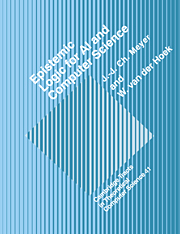3 - KNOWLEDGE AND IGNORANCE
Published online by Cambridge University Press: 11 November 2009
Summary
In previous chapters we have looked at the basic theory of knowledge and belief, along with some extensions and applications in the realms of computer science and artificial intelligence. The emphasis in this theory (or rather these theories and applications) was put upon the question of what is known or believed by the agent, and the logical systems that we have seen enable one to derive the knowledge or belief of such an agent.
In this chapter we shall switch the emphasis to the other side of the picture, namely whether one can say something about the ignorance of an agent as well. This is not as easy as it might seem at first glance. Of course, we can employ epistemic logic to express ignorance of the agent as well as its knowledge, e.g. by formulas of the form ¬Kϕ, expressing that ϕ is not known, and that the agent is thus ignorant about the truth of ϕ. One may even express a kind of total ignorance of the agent about the assertion ϕ by considering a formula of the form ¬Kϕ ∧ ¬K¬ϕ: the agent does not know ϕ nor does he know ¬ϕ. This is all perfectly fine, but how can one infer that the agent knows neither ϕ nor ¬ϕ in an actual situation? Of course, epistemic logic enables one to derive the agent's ignorance in some cases. For instance, since Kp → ¬K¬p is valid in S5, we can derive that, given Kp, the agent knows p, it holds that the agent must be ignorant about ¬p (i.e. ¬K¬p). However, now consider the following situation.
- Type
- Chapter
- Information
- Epistemic Logic for AI and Computer Science , pp. 113 - 158Publisher: Cambridge University PressPrint publication year: 1995



